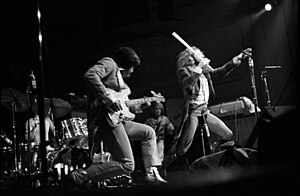
Back جيثرو تل (فريق روك) Arabic جترو تال AZB Джетро Тъл Bulgarian Jethro Tull (strollad) Breton Jethro Tull Catalan Jethro Tull Czech Jethro Tull (band) Welsh Jethro Tull Danish Jethro Tull German Jethro Tull Greek
Jethro Tull | |
|---|---|
 Jethro Tull live in Hamburg in 1973 | |
| Background information | |
| Origin | Blackpool, Lancashire, England |
| Genres | |
| Discography | Jethro Tull discography |
| Years active |
|
| Labels | |
| Spinoffs | |
| Members |
|
| Past members | |
| Website | jethrotull |
Jethro Tull are a British rock band formed in Blackpool, Lancashire in 1967. Initially playing blues rock and jazz fusion, the band soon incorporated elements of English folk music, hard rock and classical music, forging a signature progressive rock sound.[1] The group's founder, bandleader, principal composer, lead vocalist, and only constant member is Ian Anderson, a multi-instrumentalist who mainly plays flute and acoustic guitar. The group has featured a succession of musicians throughout the decades, including significant contributors such as guitarists Mick Abrahams and Martin Barre (with Barre being the longest-serving member besides Anderson); bassists Glenn Cornick, Jeffrey Hammond, John Glascock, Dave Pegg, Jonathan Noyce, and David Goodier; drummers Clive Bunker, Barrie "Barriemore" Barlow and Doane Perry; and keyboardists John Evan, Dee Palmer, Peter-John Vettese, Andrew Giddings, and John O'Hara.
The band achieved moderate recognition in the London club scene and released their debut album, This Was, in 1968. After a line-up change which saw original guitarist Mick Abrahams replaced by Martin Barre, the band released a folk-tinged second album, Stand Up, in 1969. Stand Up, which reached No. 1 in the UK, gave the band their first commercial success, and regular tours of the UK and the US followed. Their musical style shifted in the direction of progressive rock starting with Aqualung (1971), which went on to become the band's most commercially-successful album. Their musical style shifted again to folk rock in the late 1970s. In the early 1980s the band underwent a major line-up change and began to lean into electronic rock. The band won their sole Grammy Award for the 1987 album Crest of a Knave, which saw them returning to a hard-rock style. Jethro Tull have sold an estimated 60 million albums worldwide,[2] with 11 gold and 5 platinum albums.[3] They have been described by Rolling Stone as "one of the most commercially successful and eccentric progressive rock bands".[4]
The band ceased studio recording activity in the 2000s, but continued to tour until splitting in 2011. Following the band's split, Anderson and Barre continued to record and tour as solo artists, with Anderson's band billed variously as both "Jethro Tull" and "Ian Anderson" solo. Anderson said in 2014 that Jethro Tull had come "more or less to an end".[5] Starting in 2017 however, Anderson revived the Jethro Tull name and returned to releasing new studio albums in the 2020s. The current group includes musicians who were part of Jethro Tull during the last years of its initial run, as well as newer musicians associated with Anderson's solo band, without Barre's involvement.
- ^ Eder, Bruce. "Jethro Tull". AllMusic. Retrieved 31 March 2012.
- ^ "Ian Anderson's 'Homo Erraticus' released on 14 April". Official Jethro Tull website. 31 January 2014. Retrieved 27 March 2014.
- ^ "Jethro Tull – Biography". Billboard.com. Retrieved 1 May 2015.
- ^ "Jethro Tull Biography". Rolling Stone. Archived from the original on 10 July 2011. Retrieved 27 March 2014.
- ^ Graff, Gary (15 April 2014). "Ian Anderson Releases New Solo Album, Talks 'End' of Jethro Tull". Billboard. Retrieved 17 April 2014.